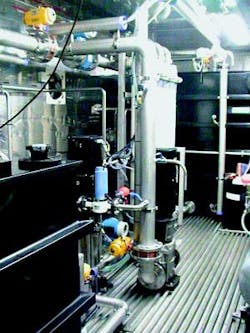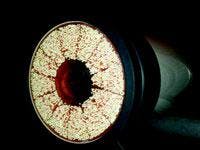Direct capillary nanofiltration removes pesticides from water
By Harry Futselaar, Harry van Dalfsen and Bert Welkers
A low-pressure capillary nanofiltration (NF) installation, designed as a compact mobile unit, purifies water by removing pesticides and other contaminants from surface and wastewater, according to NORIT Mem-brane Technology, based in Hengelo, The Netherlands. This innovation combines properties of two separate membrane modules into one element: the ease of cleaning capillary ultrafiltration membranes and the separation properties of a spiral wound NF membrane element.
NORIT developed low-pressure NF capillary membranes to reduce the cost of producing process water from wastewater. Since the mid-1990s, semi dead-end ultrafiltration (UF) has been used successfully as a new pre-treatment step for spiral-wound modules creating an effective barrier to suspended material. Such a UF system can be cleaned hydraulically using reverse flow (back flushing) and/or air-enhanced forward flushing. This procedure is called AirFlush® (regular air/water flushing) and reduces the use of cleaning chemicals significantly. Currently, water production using capillary UF followed by spiral wound NF (or reverse osmosis) results in costs higher than Z 1.00 (US$0.88) per m3; with this capillary NF process, however the price is expected to drop to Z 0.50 per m3 as the product matures.
Presently, this product is still at the introductory stage and production is being scaled up. In the meantime, the first commercial applications are being developed in close co-operation with selected end-users in order to finalise this purification concept and to speed up the time-to-market path. Typical NF applications under development are de-colouring and softening of water sources to be used as process water. Other applications of interest are mobile units in case of emergency or temporary water needs.
Additionally, NORIT also evaluated a new process concept for NF - semi dead-end filtration. This operational method is already common for UF, but is now available for NF. Keys of this concept are dead-end operation during the production step and purging by means of AirFlush® to significantly reduce operational costs.
Large amounts of water are used only once for cleaning purposes in many domestic and industrial applications before they are discharged into the sewage system. Generally, the source for this washing water is potable water or locally pumped groundwater. However, these sources are becoming scarce due to increasing water prices or due to environmental legislation that penalises the intake of groundwater to prevent soil dehydration.
The demand for fresh water is increasing, while the total amount of water on earth remains constant. Surface water pollution and increasing water demands magnify the availability problem. Water purification, therefore, will play a key role in the next few decades as lower-quality sources, such as surface water and treated wastewater effluent, provide the main feed stock for process water production.
Membrane technology is one new treatment method for producing water from contaminated sources. Membrane filtration is a physical separation process that transforms contaminated water into a clean permeate. The properties of the semi-permeable membrane determine the quality of the permeate. A NF membrane removes bacteria and viruses, for example, in addition to pesticides, organic matter, heavy metals, and to some degree, salts. The permeate is high quality and can be used as process water for industry.
The NORIT Direct Capillary NF treats water from various sources in a single step to produce high-quality permeate, which can be used as process water for industry; therefore the NF process is referred to as "direct capillary NF".
The NF process was tested on effluent from a sewage treatment plant and on surface water. Trial studies demonstrated that direct capillary NF with capillaries results in long-term stable flux behaviour with minimal chemical cleanings. AirFlush® stabilised the flux and reduced the amount of chemical cleanings.
Authors' note
Managing Director Bert Welkers, Market Development Manager Harry van Dalfsen and Technology Development Manager Harry Futselaar of NORIT Membrane Technology are based in Hengelo, The Netherlands.


